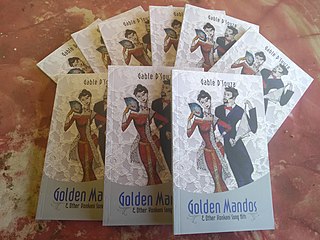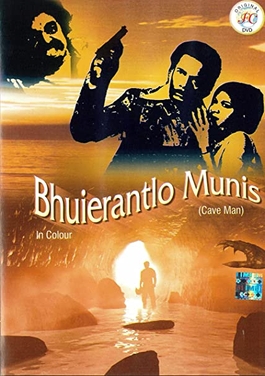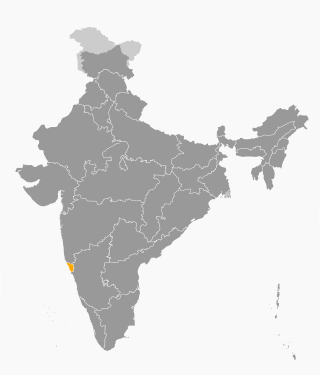Related Research Articles

Konkani is an Indo-Aryan language spoken by the Konkani people, primarily in the Konkan region, along the western coast of India. It is one of the 22 scheduled languages mentioned in the Indian Constitution, and the official language of the Indian state of Goa. It is a minority language in Karnataka, Maharashtra, Kerala, Gujarat & Damaon, Diu & Silvassa.

Music of Goa refers to music from the state of Goa, on the west coast of India. A wide variety of music genres are used in Goa ranging from Western art music to Indian classical music. Konkani music is also popular across this tiny state. Being a former territory of Portugal, Goa has a dominant western musical scene with the use of instrument such as the violin, drums, guitar, trumpet and piano. It has also produced a number of prominent musicians and singers for the world of Indian music. Portuguese Fado also has significance in Goa.
This article is about the culture of natives of the Indian state of Goa. Goans are commonly said to be born with music and football in their blood because both are deeply entrenched in Goan culture.
Mangalorean Catholics are an ethno-religious community of Latin Catholics in India typically residing in the Diocese of Mangalore in the erstwhile South Canara area, by the southwestern coast of present-day Karnataka.
Goan Catholics are an ethno-religious community of Indian Christians following the Roman Rite of worship from the Goa state, in the southern part of the Konkan region along the west coast of India. They are Konkani people and speak the Konkani language.
Goans is the demonym used to describe the people native to Goa, India, who form an ethno-linguistic group resulting from the assimilation of Indo-Aryan, Dravidian, Indo-Portuguese, and Austro-Asiatic ethnic and/or linguistic ancestries. They speak different dialects of Konkani language natively, collectively known as Goan Konkani. "Goanese" is an incorrect term for Goans.

Mando or Manddo is a musical form that evolved during the 19th and 20th centuries among the Goan Catholics. It represents a meeting point of local Goan and western musical traditions.
Deknni is a semi classical Goan dance form. The plural of dekṇi in Konkani remains the same.
Goan Catholic names and surnames encompass the different types of names and surnames used by the Goan Catholics of Goa.

Lorna Cordeiro, also known as Lorna, is a Konkani singer from the coastal state of Goa, India, and is popularly known as the "Nightingale of Goa".
The Culture of Goan Catholics is a blend of Portuguese and Konkani cultures, with the former having a more dominant role because the Portuguese ruled Goa directly from 1510 to 1961.
Tiatr is a type of musical theatre popular in the state of Goa on the west coast of India as well as in Mumbai and with expatriate communities in the Middle East, United Kingdom and other cities where Konkani speakers have a considerable presence. The dramas are performed mainly in the Roman Konkani dialects and include music, dancing and singing. Tiatr performers are called tiatrists.

Fugdi is a Maharashtra and Goan folk dance performed by the women in the Konkan region during Hindu religious festivals like Ganesh Chaturthi and Vrata or towards the end of other dances like Dhalo.According to certain historical facts, this dance style is said to have been created from few ancient Goan traditions. In addition, this dance is mainly performed during the Hindu month of “Bhaadrapaada”, when women usually take a break to escape boredom arising from their daily routines. Furthermore, it is also performed during religious and social events.
The Konkani language agitations were a series of protests and demonstrations in India, concerning the uncertain future and the official status of the Konkani language. They were held by Goans in the then union territory of Goa, Daman and Diu governed at the time by the Maharashtrawadi Gomantak Party. The protests involved citizen journalism, student activism and political demonstrations.

Bhuierantlo Munis is a 1977 Indian Konkani-language drama film. The first colour film in Konkani, it was produced under the banner of Chripton Motion Pictures by Tony Coutinho and Chris Perry and released in 1977. The film was shot in Goa, and also has footage shot in Paris, America and an ice-skating competition in Russia.
Old Goan Gold is a music album by Remo Fernandes and released in 1985. It consists of songs in Konkani and Portuguese. Alisha Chinai has also performed in the album.

Dhalo is a popular ritual folk dance form Goa, India. The dance is performed by women and serves as a prayer of protection for their households. The songs to which the dance is performed are usually sung in Konkani language or Marathi.The themes of such songs are commonly religious or social in nature. It is conducted over a period of 1 week in the month of Pousha at the onset of winter. On the final day women dress up elaborately and draw caricatures of men.

The following outline is provided as an overview of and topical guide to Goa:
Reginaldo Fernandes (1914–1994), better known as Reginald Fernandes was a writer, musician and cultural figure from the world of Goan and Konkani music. He was known for having written a vast number of Konkani romans novels, over a hundred in number. He has been called the "King of Konkani Fiction".
References
- Rodrigues, Francis (2009), Greatest Konkani Song Hits Vol. 1, Toronto: Pater Publications, ISBN 978-0-9811794-0-7 , retrieved 2010-02-19